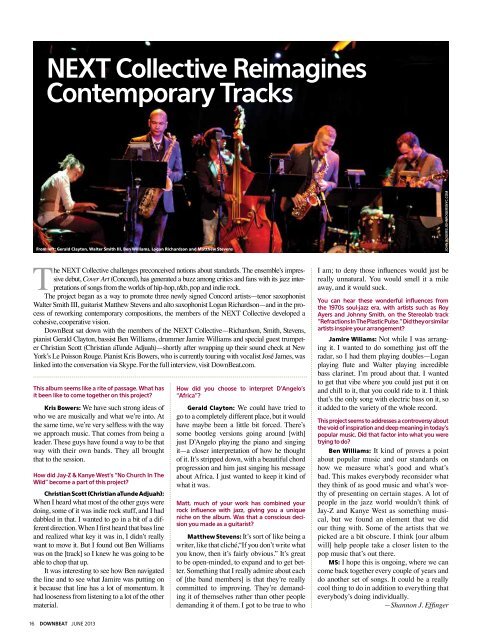Create successful ePaper yourself
Turn your PDF publications into a flip-book with our unique Google optimized e-Paper software.
NEXT Collective ReimaginesContemporary TracksFrom left: Gerald Clayton, Walter Smith III, Ben Williams, Logan Richardson and Matthew Stevensjohn rogers/johnrogersnyc.comThe NEXT Collective challenges preconceived notions about standards. The ensemble’s impressivedebut, Cover Art (Concord), has generated a buzz among critics and fans with its jazz interpretationsof songs from the worlds of hip-hop, r&b, pop and indie rock.The project began as a way to promote three newly signed Concord artists—tenor saxophonistWalter Smith III, guitarist Matthew Stevens and alto saxophonist Logan Richardson—and in the processof reworking contemporary compositions, the members of the NEXT Collective developed acohesive, cooperative vision.DownBeat sat down with the members of the NEXT Collective—Richardson, Smith, Stevens,pianist Gerald Clayton, bassist Ben Williams, drummer Jamire Williams and special guest trumpeterChristian Scott (Christian aTunde Adjuah)—shortly after wrapping up their sound check at NewYork’s Le Poisson Rouge. Pianist Kris Bowers, who is currently touring with vocalist José James, waslinked into the conversation via Skype. For the full interview, visit DownBeat.com.This album seems like a rite of passage. What hasit been like to come together on this project?Kris Bowers: We have such strong ideas ofwho we are musically and what we’re into. Atthe same time, we’re very selfless with the waywe approach music. That comes from being aleader. These guys have found a way to be thatway with their own bands. They all broughtthat to the session.How did Jay-Z & Kanye West’s “No Church In TheWild” become a part of this project?Christian Scott (Christian aTunde Adjuah):When I heard what most of the other guys weredoing, some of it was indie rock stuff, and I haddabbled in that. I wanted to go in a bit of a differentdirection. When I first heard that bass lineand realized what key it was in, I didn’t reallywant to move it. But I found out Ben Williamswas on the [track] so I knew he was going to beable to chop that up.It was interesting to see how Ben navigatedthe line and to see what Jamire was putting onit because that line has a lot of momentum. Ithad looseness from listening to a lot of the othermaterial.How did you choose to interpret D’Angelo’s“Africa”?Gerald Clayton: We could have tried togo to a completely different place, but it wouldhave maybe been a little bit forced. There’ssome bootleg versions going around [with]just D’Angelo playing the piano and singingit—a closer interpretation of how he thoughtof it. It’s stripped down, with a beautiful chordprogression and him just singing his messageabout Africa. I just wanted to keep it kind ofwhat it was.Matt, much of your work has combined yourrock influence with jazz, giving you a uniqueniche on the album. Was that a conscious decisionyou made as a guitarist?Matthew Stevens: It’s sort of like being awriter, like that cliché,“If you don’t write whatyou know, then it’s fairly obvious.” It’s greatto be open-minded, to expand and to get better.Something that I really admire about eachof [the band members] is that they’re reallycommitted to improving. They’re demandingit of themselves rather than other peopledemanding it of them. I got to be true to whoI am; to deny those influences would just bereally unnatural. You would smell it a mileaway, and it would suck.You can hear these wonderful influences fromthe 1970s soul-jazz era, with artists such as RoyAyers and Johnny Smith, on the Stereolab track"Refractions In The Plastic Pulse." Did they or similarartists inspire your arrangement?Jamire Wiliams: Not while I was arrangingit. I wanted to do something just off theradar, so I had them playing doubles—Loganplaying flute and Walter playing incrediblebass clarinet. I’m proud about that. I wantedto get that vibe where you could just put it onand chill to it, that you could ride to it. I thinkthat’s the only song with electric bass on it, soit added to the variety of the whole record.This project seems to addresses a controversy aboutthe void of inspiration and deep meaning in today’spopular music. Did that factor into what you weretrying to do?Ben Williams: It kind of proves a pointabout popular music and our standards onhow we measure what’s good and what’sbad. This makes everybody reconsider whatthey think of as good music and what’s worthyof presenting on certain stages. A lot ofpeople in the jazz world wouldn’t think ofJay-Z and Kanye West as something musical,but we found an element that we didour thing with. Some of the artists that wepicked are a bit obscure. I think [our albumwill] help people take a closer listen to thepop music that’s out there.MS: I hope this is ongoing, where we cancome back together every couple of years anddo another set of songs. It could be a reallycool thing to do in addition to everything thateverybody’s doing individually.—Shannon J. Effinger16 DOWNBEAT JUNE 2013
















